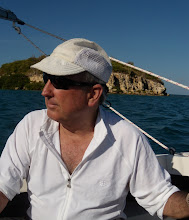We were experiencing engine problems and electricity generating problems on the way to Bermuda. If it had been just one of these problems we might have pressed on, but the combination persuaded us to turn back toward the USA at about 11:30 AM Sunday. We decided to go to Southport, NC, ironically the departure point of Charles Huneycutt abord Flicka "Ranger". We mere mostly through the Gulf Stream and so had to make our way back through a lot of lumpy seas, but the SE angle of the wind, which had been on the nose ever since we got started, was finally excellent for the diversion to Southport which was essentially northwast from our turning position.
The sailing was wonderful until about 10 PM. Then it stopped. For the next 13 hours we had only zephyrs up to 5 kts. In 5 kts of wind a Flicka barely has steerage. Without the engine we could not generate electricity...it was night so the solar panels were useless, and the wind was too light for the wind turbine. We used only the navigation lights in order to conserve electricity.
Finally a little breeze began to develop around 11 AM Monday, and by noon we were again barreling towards Southport, arriving at 4:30 PM. This being Memorial Day week-end, shore accommodations were tight but we found The Riverside Motel, a room with two beds with a view of the dumpster, clean sheets, and a shower and TV for $83. The proprietor, Jeramy, came to the Southport Marina to pick us up and diagnosed the engine problem on the way back to the motel, about 3 blocks distant. Fuel contamination.
This morning, Tuesday, I was at the marina's office when they opened at 8. Their man Sean walked to the boat with me, and after finding that the fluids were fine sheckked the Racor (primary) fuel filter. Sure enough, bad stuff (algea and sludge) in the filter. We also checked the secondary filter and found just small traces of bad stuff. We drained the fuel from the tank and inspected the inside of the tank. Small scaling, not bad, and a bit of sludge on the bottom, again not too bad. We put 2 gallons of fresh fuel in the tank, let it settle, and tried using the boat's electric fuel pump into a bucket to see the contition of the fuel. Well, the fuel pump worked only intermittantly. A tap with a wrench would cause it to work for a while, irregularly. Sean checked for blockage in the fuel line coming from the tank (in the bow) to the engine (in the stern). You won't believe this. Sean sucked on the line until a blob of something other than fuel entered his mouth. He spit the blob into the bucket. "Well there's the real problem" he said casually as I handed h9im a Wint-o-green breath mint. There is a 90 degree elbow in the fuel line where it emerges from the tank, famous for creating blockages. We figured the blockage in the line, combined with the contamination in the fuel, had stressed the electronic fuel pump and wore it out. So we replaced the fuel pump and replaced both folters and bled the air out of the line, and the engine cranked up and sounded perfect. We let it run on high idle for a while. We think this is fixed.
We checked the output of the wind turbine generator, and it is fine. I have an on-off switch for the generator in the head, and inadvertantly the switch had been turned to the off position, causing an unexpected and unexplained drain on the batteries. They are now re-charging.
Our plan is to depart tomorrow (Wednesday) for Nova Scotia. I will lay out the route tonight. I expect this to take 9 or 10 days. We have not been achieving the 3.5 kts that had been built into my plan. Several factors. First, the wind has been consistently on our nose. A Flicka is a fine boat, but going to windward is not its long suit. In the lumpy seas associated with the Gulf Stream it is necessary to let this boat "foot". We are sailing to windward at about 45 to 50 degrees from the apparent wind. The true wind is about 60 degrees. So, tacking takes us through a 120 degree arc from port tack to starboard (and vice versa). Second, the wind has been exceedingly light, mostly zero to 10 kts. We celebrate when we are moving 3.5 kts to windward. Third, we are loaded with more weight than in a normal sail. We started out with provisions for 18+ days, a big inventory of sails, and lots of gear.
Nova Scotia is about 700 nautical miles from here. If we can make 80 miles a day we'll make it in 9 days. The wind direction and velocity will be the determining factors. We'll get off to a good start tomorrow with 10 to 15 kts from the SW.
I am relieved that the engine and generating turbine are again working, and I look forward to having a good passage to Nova Scotia. JD and I are both disappointed to not make it to Bermuda.
Woody
Tuesday, June 1, 2010
Subscribe to:
Comments (Atom)
